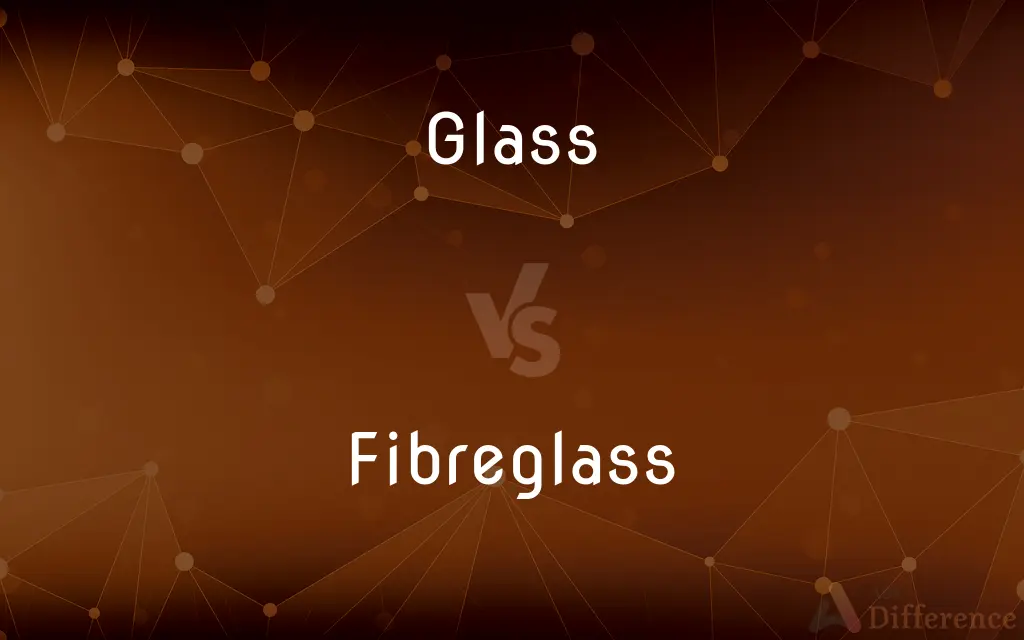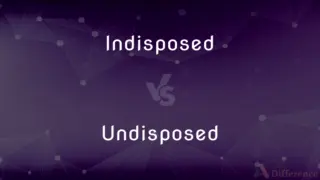Glass vs. Fibreglass — What's the Difference?
Edited by Tayyaba Rehman — By Maham Liaqat — Updated on March 22, 2024
Glass is a transparent material made from silica, while fibreglass consists of glass fibers reinforced with resin.

Difference Between Glass and Fibreglass
Table of Contents
ADVERTISEMENT
Key Differences
Glass is a hard, brittle substance typically made by melting silica (sand) with various additives at high temperatures. This process creates a transparent, amorphous solid that is used widely in windows, bottles, and many other objects due to its clarity and the ability to manipulate its properties during manufacturing. Fibreglass, on the other hand, is a composite material made by embedding small glass fibers in a resin matrix. The glass fibers, which are essentially very thin strands of glass, provide strength and flexibility to the composite, while the resin holds the fibers together and shapes the material.
The main difference between glass and fibreglass lies in their composition and structure. Glass, in its most common form, is a uniform, homogenous material with a smooth surface, while fibreglass consists of numerous tiny glass fibers combined with a resin. This structural difference gives fibreglass its unique properties, such as enhanced strength, durability, and resistance to impact, which differ significantly from those of traditional glass.
While glass is prized for its transparency and aesthetic qualities, fibreglass is valued for its practical properties, including its strength-to-weight ratio and resistance to corrosion. Fibreglass does not have the clarity or smooth surface of glass but can be finished in various textures and colors, offering flexibility in design and application.
The manufacturing processes for glass and fibreglass also differ. Glassmaking involves heating silica to a liquid state and then cooling it to form a solid, often involving blowing or molding to create specific shapes. Fibreglass production, however, involves extruding molten glass into thin strands, coating these strands with resin, and then shaping and curing the material to form a solid composite.
Both glass and fibreglass require specific handling and care due to their properties. Glass must be protected from impacts and sharp temperature changes to prevent cracking or breaking, while fibreglass, though more durable, can be susceptible to damage from UV light and harsh chemicals, requiring protective coatings or treatments for long-term use.
ADVERTISEMENT
Comparison Chart
Composition
Made from silica (sand) with various additives.
Composed of glass fibers embedded in a resin matrix.
Properties
Transparent, hard, and brittle.
Strong, lightweight, and can be molded into shapes.
Uses
Windows, bottles, ornaments.
Boat hulls, automotive parts, insulation.
Manufacturing
Melting and cooling silica, often with molding or blowing.
Extruding glass into fibers, combining with resin, shaping, and curing.
Strength
Brittle, can be tempered for strength.
High strength-to-weight ratio, impact-resistant.
Durability
Susceptible to breakage upon impact.
Resistant to corrosion, durable under various conditions.
Aesthetic Qualities
Prized for clarity and smooth surface.
Can be finished in various textures and colors.
Care and Maintenance
Must be protected from impact and temperature changes.
May require UV protection and resistance to chemicals.
Compare with Definitions
Glass
A transparent material made from silica.
The artist crafted a beautiful vase from blown glass.
Fibreglass
A composite material of glass fibers and resin.
The fibreglass hull of the boat was both lightweight and durable.
Glass
Used widely in windows for its clarity.
The glass windows provided a clear view of the garden.
Fibreglass
Common in insulation materials.
The attic was insulated with fibreglass to retain heat.
Glass
Prized for aesthetic features in ornaments.
The delicate glass figurines sparkled under the light.
Fibreglass
Durable and resistant to corrosion.
The fibreglass tanks were ideal for storing corrosive chemicals.
Glass
Requires careful handling to avoid breakage.
She carefully packed the glass dishes to prevent them from breaking.
Fibreglass
Used in automotive parts for its strength.
The sports car featured a sleek fibreglass body.
Glass
Can be tempered for safety.
The building used tempered glass for its exterior.
Fibreglass
Can be molded into various shapes.
The fibreglass chairs were designed for both comfort and style.
Glass
Glass is a non-crystalline, often transparent amorphous solid, that has widespread practical, technological, and decorative use in, for example, window panes, tableware, and optics. Glass is most often formed by rapid cooling (quenching) of the molten form; some glasses such as volcanic glass are naturally occurring.
Fibreglass
Silica based glass extruded into fibers that possess a length at least 1000 times greater than their width.
Glass
A hard, brittle substance, typically transparent or translucent, made by fusing sand with soda and lime and cooling rapidly. It is used to make windows, drinking containers, and other articles
The screen is made from glass
A glass door
Fibreglass
Ellipsis of fibreglass wool
Glass
A drinking container made from glass
A beer glass
Fibreglass
A composite material made from fine fibres of spun glass held together with resin.
Glass
A lens, or an optical instrument containing a lens or lenses, in particular a monocle or a magnifying lens.
Fibreglass
To apply fibreglass to.
To fibreglass the hull of a fishing-boat
Glass
A mirror
She couldn't wait to put the dress on and look in the glass
Fibreglass
Same as fiberglass.
Glass
Cover or enclose with glass
The inn has a long gallery, now glassed in
Fibreglass
A covering material made of glass fibers in resins
Glass
(especially in hunting) scan (one's surroundings) with binoculars
The first day was spent glassing the rolling hills
Glass
Hit (someone) in the face with a beer glass
He glassed the landlord because he'd been chatting to Jo
Glass
Reflect as if in a mirror
The opposite slopes glassed themselves in the deep dark water
Glass
Any of a large class of materials with highly variable mechanical and optical properties that solidify from the molten state without crystallization, are typically made by silicates fusing with boric oxide, aluminum oxide, or phosphorus pentoxide, are generally hard, brittle, and transparent or translucent, and are considered to be supercooled liquids rather than true solids.
Glass
A drinking vessel.
Glass
A mirror.
Glass
A barometer.
Glass
A window or windowpane.
Glass
The series of transparent plastic sheets that are secured vertically above the boards in many ice rinks.
Glass
Glasses A pair of lenses mounted in a light frame, used to correct faulty vision or protect the eyes.
Glass
Often glasses A binocular or field glass.
Glass
A device, such as a monocle or spyglass, containing a lens or lenses and used as an aid to vision.
Glass
The quantity contained by a drinking vessel; a glassful.
Glass
Objects made of glass; glassware.
Glass
Made or consisting of glass.
Glass
Fitted with panes of glass; glazed.
Glass
To enclose or encase with glass.
Glass
To put into a glass container.
Glass
To provide with glass or glass parts.
Glass
To make glassy; glaze.
Glass
To see reflected, as in a mirror.
Glass
To reflect.
Glass
To scan (a tract of land or forest, for example) with an optical instrument.
Glass
To become glassy.
Glass
To use an optical instrument, as in looking for game.
Glass
An amorphous solid, often transparent substance, usually made by melting silica sand with various additives (for most purposes, a mixture of soda, potash and lime is added).
The tabletop is made of glass.
A popular myth is that window glass is actually an extremely viscous liquid.
Glass
Any amorphous solid (one without a regular crystal lattice).
Metal glasses, unlike those based on silica, are electrically conductive, which can be either an advantage or a disadvantage, depending on the application.
Glass
(countable) A vessel from which one drinks, especially one made of glass, plastic, or similar translucent or semi-translucent material.
Fill my glass with milk, please.
Glass
(metonymically) The quantity of liquid contained in such a vessel.
There is half a glass of milk in each pound of chocolate we produce.
Glass
(uncountable) Glassware.
We collected art glass.
Glass
A mirror.
She adjusted her lipstick in the glass.
Glass
A magnifying glass or telescope.
Glass
(sport) A barrier made of solid, transparent material.
Glass
The backboard.
He caught the rebound off the glass.
Glass
(ice hockey) The clear, protective screen surrounding a hockey rink.
He fired the outlet pass off the glass.
Glass
A barometer.
Glass
Transparent or translucent.
Glass frog;
Glass shrimp;
Glass worm
Glass
(obsolete) An hourglass.
Glass
Lenses, considered collectively.
Her new camera was incompatible with her old one, so she needed to buy new glass.
Glass
A pane of glass; a window (especially of a coach or similar vehicle).
Glass
(transitive) To fit with glass; to glaze.
Glass
(transitive) To enclose in glass.
Glass
(transitive) fibreglass To fit, cover, fill, or build, with fibreglass-reinforced resin composite (fiberglass).
Glass
To strike (someone), particularly in the face, with a drinking glass with the intent of causing injury.
Glass
To bombard an area with such intensity (nuclear bomb, fusion bomb, etc) as to melt the landscape into glass.
Glass
(transitive) To view through an optical instrument such as binoculars.
Glass
(transitive) To smooth or polish (leather, etc.), by rubbing it with a glass burnisher.
Glass
To reflect; to mirror.
Glass
(transitive) To make glassy.
Glass
(intransitive) To become glassy.
Glass
A hard, brittle, translucent, and commonly transparent substance, white or colored, having a conchoidal fracture, and made by fusing together sand or silica with lime, potash, soda, or lead oxide. It is used for window panes and mirrors, for articles of table and culinary use, for lenses, and various articles of ornament.
Glass
Any substance having a peculiar glassy appearance, and a conchoidal fracture, and usually produced by fusion.
Glass
Anything made of glass.
She would not liveThe running of one glass.
Glass
A drinking vessel; a tumbler; a goblet; hence, the contents of such a vessel; especially; spirituous liquors; as, he took a glass at dinner.
Glass coaches are [allowed in English parks from which ordinary hacks are excluded], meaning by this term, which is never used in America, hired carriages that do not go on stands.
Glass
To reflect, as in a mirror; to mirror; - used reflexively.
Happy to glass themselves in such a mirror.
Where the Almighty's form glasses itself in tempests.
Glass
To case in glass.
Glass
To cover or furnish with glass; to glaze.
Glass
To smooth or polish anything, as leater, by rubbing it with a glass burnisher.
Glass
A brittle transparent solid with irregular atomic structure
Glass
A glass container for holding liquids while drinking
Glass
The quantity a glass will hold
Glass
A small refracting telescope
Glass
Amphetamine used in the form of a crystalline hydrochloride; used as a stimulant to the nervous system and as an appetite suppressant
Glass
A mirror; usually a ladies' dressing mirror
Glass
Glassware collectively;
She collected old glass
Glass
Furnish with glass;
Glass the windows
Glass
Scan (game in the forest) with binoculars
Glass
Enclose with glass;
Glass in a porch
Glass
Put in a glass container
Glass
Become glassy or take on a glass-like appearance;
Her eyes glaze over when she is bored
Common Curiosities
Can fibreglass be transparent like glass?
Fibreglass is not typically transparent due to its fibrous structure and resin content, unlike the clear, smooth surface of glass.
What is the primary difference between glass and fibreglass?
The primary difference is in their composition; glass is a homogenous material made from silica, while fibreglass is a composite made of glass fibers embedded in resin.
Is fibreglass stronger than glass?
Fibreglass generally has a higher strength-to-weight ratio and is more impact-resistant than standard glass, due to the reinforcement provided by the glass fibers.
Can both glass and fibreglass be used in construction?
Yes, both materials are used in construction, but for different purposes; glass is often used for windows and facades, while fibreglass is used for insulation, roofing, and other structural components.
How are glass and fibreglass manufactured?
Glass is manufactured by melting and cooling silica, often shaped through blowing or molding, while fibreglass is made by extruding molten glass into fibers, combining with resin, and curing.
Are there environmental concerns associated with glass or fibreglass?
Both materials have environmental impacts, including energy consumption during production and challenges in recycling, especially for fibreglass due to its composite nature.
Can glass be recycled?
Glass is highly recyclable and can be melted down and reformed into new glass products multiple times without losing purity or quality.
Can fibreglass be repaired if damaged?
Yes, fibreglass can be repaired with specific resins and techniques, making it a practical choice for long-term use in various applications.
What safety precautions should be taken when handling fibreglass?
When handling fibreglass, it's important to wear protective clothing, gloves, and a mask to avoid skin irritation and inhalation of fibres, as they can cause discomfort and respiratory issues.
Are there different types of glass for different uses?
Yes, there are many types of glass, including tempered glass for safety, laminated glass for security and sound reduction, and low-emissivity glass for energy efficiency, each tailored for specific applications.
How does the weight of fibreglass compare to traditional materials like wood or steel?
Fibreglass is significantly lighter than traditional materials like wood and steel, which contributes to its popularity in automotive, aerospace, and marine applications where weight reduction is advantageous.
How does temperature affect glass and fibreglass?
Glass can be sensitive to sharp temperature changes, potentially leading to breakage, while fibreglass is generally more resistant to temperature fluctuations due to its composite structure.
Is fibreglass suitable for outdoor use?
Yes, fibreglass is suitable for outdoor use due to its resistance to corrosion, moisture, and temperature changes, making it ideal for items like outdoor furniture, storage tanks, and boat hulls.
What are the environmental advantages of using glass in buildings?
Glass in buildings offers environmental advantages such as natural light, which reduces the need for artificial lighting, and, when used in energy-efficient designs, can help regulate indoor temperatures, reducing heating and cooling costs.
Can the appearance of fibreglass be customized?
Yes, the appearance of fibreglass can be customized with various finishes, colors, and textures, allowing it to mimic other materials or meet specific aesthetic requirements.
How is fibreglass insulation installed, and what are its benefits?
Fibreglass insulation is typically installed in rolls or batts between wall studs, in attics, or blown in as loose fill. Its benefits include effective thermal insulation, cost-efficiency, and ease of installation.
Share Your Discovery

Previous Comparison
Globalism vs. Internationalism
Next Comparison
Indisposed vs. UndisposedAuthor Spotlight
Written by
Maham LiaqatEdited by
Tayyaba RehmanTayyaba Rehman is a distinguished writer, currently serving as a primary contributor to askdifference.com. As a researcher in semantics and etymology, Tayyaba's passion for the complexity of languages and their distinctions has found a perfect home on the platform. Tayyaba delves into the intricacies of language, distinguishing between commonly confused words and phrases, thereby providing clarity for readers worldwide.














































